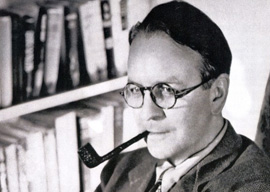
September 24, 2012

Raymond Chandler
Which brings me to Lawrence Durrell’s “Alexandria Quartet”: Justine, Balthazar, Mountolive, and Clea. Each novel is meaningless on its own. The quartet’s structure works perfectly, but it is the setting’s exoticism which, as they say, blew my mind. The quartet was written between 1957 and 1960, back when my father had sent me to the Anglo-Egyptian Sudan”as it was then called”as punishment for running up debts. He owned the region’s biggest textile mills. I spent every weekend in Alexandria and Cairo, back then magical places of easy living, easier service, and very easy sex. Durrell captures the atmosphere like a photographer”better yet, like an Impressionist painter. Anything and everything happens in Alexandria: pederasty, incest, and all the convolutions of lust, greed, and betrayal. Durrell’s Alexandria is a dream city inhabited by pashas, sophisticated foreigners, mysterious women, rich merchants, ragamuffin street vendors, drug dealers, and spies of all colors and nationalities. He wrote of the “flesh coming alive, trying the bars of its prison.” I used to play tennis with the great Baron von Cramm in the Gezira Club every morning, gamble in the Mohammed Ali Club (only foreigners and Egyptian pashas permitted) in the afternoon, and do the outdoor nightclubs at night. I was in love with a Justine type who drove me crazy despite my youth and lust for life. Those were the days. And nights.
Durrell is hardly read nowadays. Some of the untalented and illiterate phonies who write unreadable prose dismiss many of those I have mentioned as small fry. It’s like insects calling lions weaklings.
No one of my generation can write about novels without mentioning The Catcher in the Rye, which I read when I was 14. The acute observations of a boy alone in a world of hypocrisy gave me confidence that the images I had of certain people weren”t so far off. Salinger was the opposite of Waugh, whose Vile Bodies I adored however much I loathed the writer. Salinger wrote about love. Waugh, a not-so-closeted queen, wrote about guilt.
Graham Greene and George Orwell complete this very incomplete list of my favorites. (I have read most American and British novelists of that period but listed only a few choices.) Greene is our greatest Catholic writer, and Orwell predicted what our free world would turn into. Hooray for all of the above.